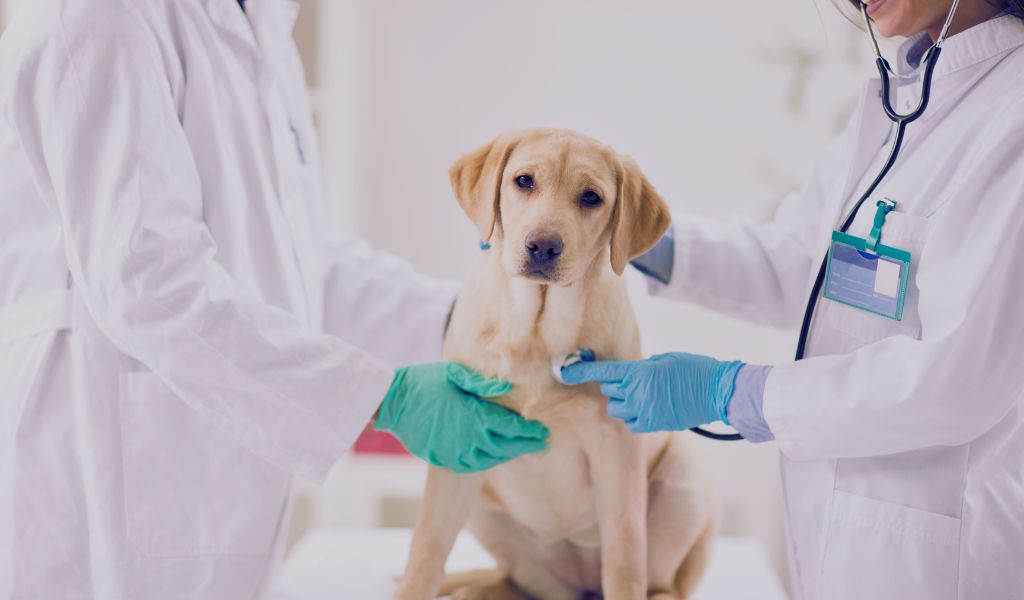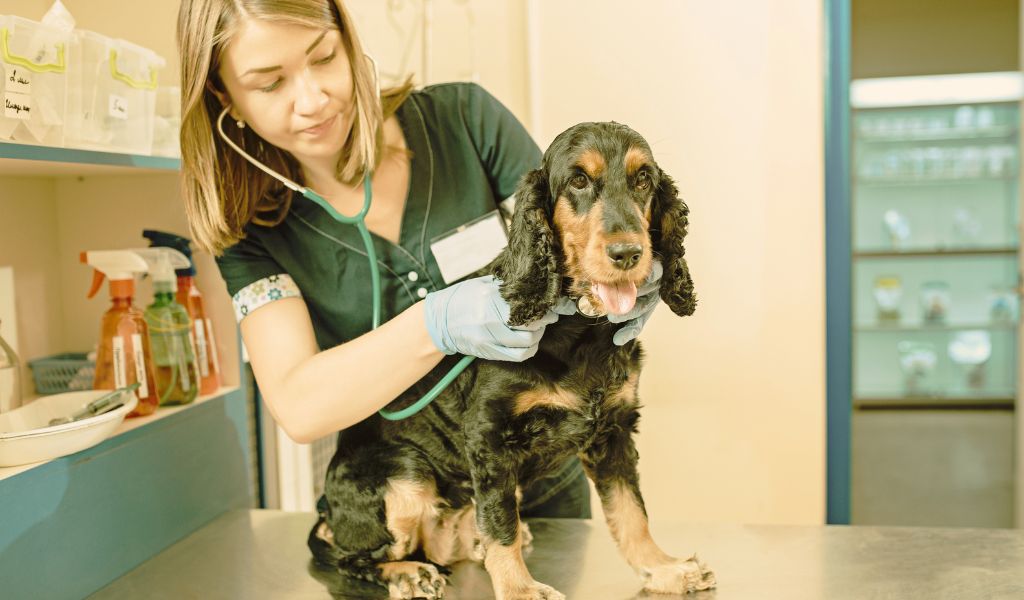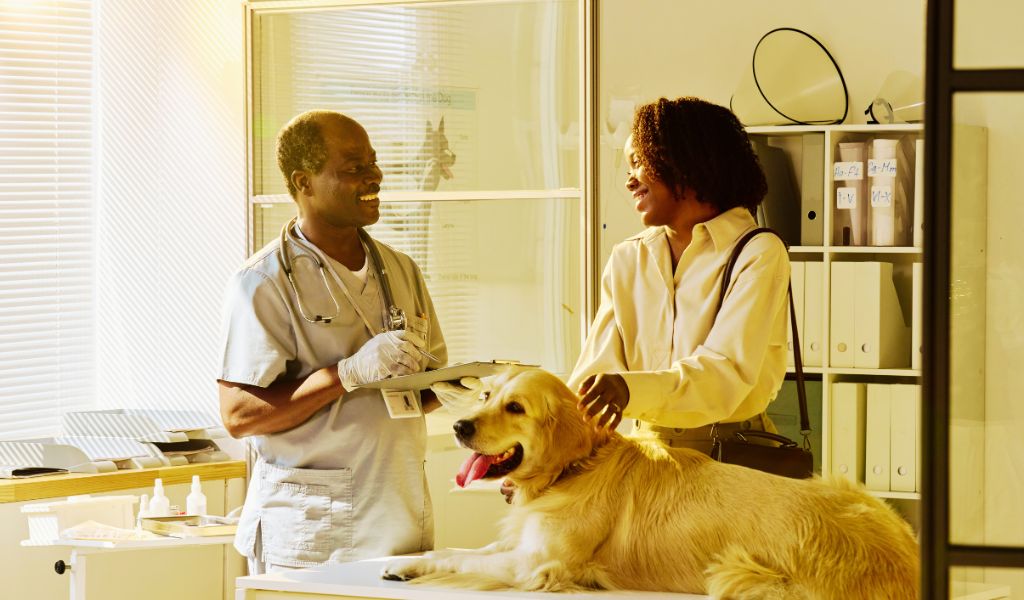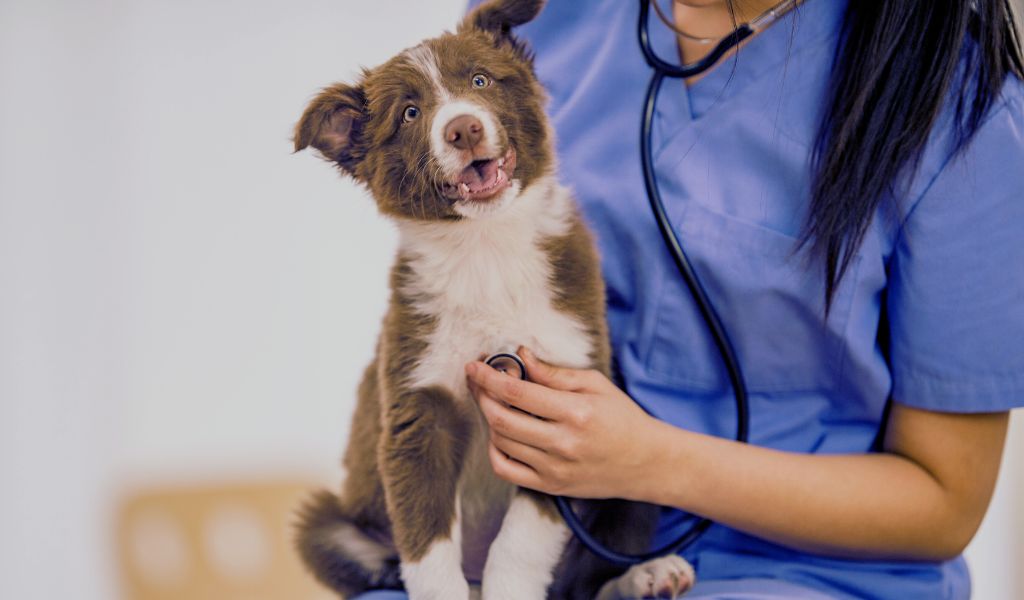Giardia, a widespread gastrointestinal parasite, often goes unnoticed yet significantly impacts dogs’ health.
Found in contaminated environments, dogs contract it through typical behaviors like sniffing and licking.
Once infected, they exhibit symptoms like diarrhea, vomiting, and weight loss, underscoring the importance of prompt attention and treatment.
Explanation of what giardia is and how it affects dogs
Giardia is a single-celled parasite that can infect both humans and animals, including dogs. It is commonly found in contaminated water sources such as streams, ponds, and even in the soil.
When a dog ingests the parasite, it can lead to an intestinal infection known as giardiasis. This infection can cause symptoms such as diarrhoea, vomiting, weight loss, and dehydration in dogs.
It can be particularly problematic for puppies and older dogs, as well as those with compromised immune systems.
Giardia can be difficult to detect as the parasite can be shed intermittently in a dog’s faeces, making it challenging to diagnose.
Treatment typically involves medications prescribed by a veterinarian, along with thorough cleaning and disinfection of the dog’s living environment to prevent re-infection.
It is important for dog owners to be vigilant in preventing their pets from coming into contact with contaminated water sources in order to reduce the risk of giardiasis.

Importance of identifying and treating giardia in dogs
Identifying and treating giardia in dogs is crucial for the health and wellbeing of our furry friends.
Left untreated, it can lead to more severe health issues and even become a potential source of infection for humans.
By identifying and treating giardia promptly, we can prevent the spread of the parasite.
It’s important to consult with a veterinarian for a proper diagnosis and treatment plan, as giardia can be challenging to detect and eradicate.
With the right medication and management, giardia in dogs can be effectively treated and controlled.
Additionally, proper hygiene and sanitation practices in the pet’s environment are essential to prevent re-infection.
By taking proactive measures to identify and treat giardia in our dogs, we can ensure their overall health and reduce the risk of transmission to other animals and humans.
KEY TAKEAWAYS:
- Giardia is a common parasite causing severe discomfort in dogs.
- It’s contracted from contaminated environments.
- Symptoms include diarrhea, vomiting, and weight loss.
- Early diagnosis and treatment are crucial.
- Regular vet check-ups and clean environments help prevent giardia.
- Medication and hygiene practices are key in treatment.
Understanding Giardia
Signs and symptoms of giardia in dogs
Giardia in dogs can present with a variety of signs and symptoms, making it difficult for pet owners to identify without a proper diagnosis.
Common symptoms of giardia in dogs include diarrhoea, which may be recurrent and watery, as well as vomiting and weight loss.
Some dogs may also exhibit lethargy, lack of appetite, and abdominal pain. In severe cases, giardia can lead to dehydration and malnutrition.
Additionally, infected dogs may have a dull and unkempt coat due to poor absorption of nutrients.
It is important to note that some dogs may be carriers of giardia without showing any symptoms, making it crucial to have regular fecal tests done by a veterinarian.
If you suspect your dog may have giardia, it is important to seek veterinary care promptly to prevent the spread of the parasite and to provide appropriate treatment for your pet.
How giardia is diagnosed in dogs
Giardia in dogs is typically diagnosed through a combination of clinical signs, faecal testing, and sometimes blood tests.
If a dog is showing symptoms such as diarrhea, vomiting, and weight loss, the veterinarian may suspect giardia and recommend a faecal test to check for the presence of giardia cysts.
This can involve collecting a fresh stool sample and sending it to a laboratory for microscopic analysis.
In some cases, a blood test may also be used to detect antibodies to giardia in the dog’s system, indicating a current or past infection.
It’s important to note that giardia can be difficult to detect in fecal samples, as cysts are shed intermittently, so multiple samples may be required for an accurate diagnosis.
Additionally, other diagnostic tools such as ultrasound or endoscopy may be used if the giardia infection is suspected to be causing more severe symptoms or complications.
Early detection and diagnosis of giardia in dogs is crucial for effective treatment and preventing the spread of the parasite.
Treating Giardia in dogs
Giardia in dogs can be a frustrating and uncomfortable condition for both the pet and their owner.
The most common treatment for Giardia in dogs is a prescribed medication from a veterinarian, typically metronidazole or fenbendazole.
These medications work to kill the Giardia organisms in the dog’s intestine and relieve symptoms such as diarrhoea, vomiting, and weight loss.
It’s important to closely follow the vet’s instructions when giving your dog these medications, as they can have side effects and may require a specific dosage schedule.
In addition to medication, it’s crucial to thoroughly clean and disinfect your dog’s living environment to prevent reinfection.
This includes washing bedding, toys, and food and water dishes, as well as regularly cleaning up your dog’s feces from the yard.
With proper treatment and hygiene practices, most dogs can overcome a Giardia infection and return to good health.
Medications and treatments available for giardia in dogs
Giardia in dogs can be treated with medications such as metronidazole, fenbendazole, or a combination of both.
Metronidazole is the most commonly prescribed medication for giardia and is usually given for 5-7 days. This medication works by targeting and killing the giardia parasite in the dog’s intestines.
Fenbendazole is another commonly used drug for treating giardia and is often given for 3-5 days.
Some veterinarians may also recommend a combination of these two medications for more effective treatment.
In addition to medications, it is important for dogs with giardia to receive supportive care such as fluid therapy and a bland diet to help manage symptoms such as diarrhoea and vomiting.
It is crucial to follow the veterinarian’s instructions carefully and to administer the medications as prescribed to ensure successful treatment of giardia in dogs.
Repeated faecal testing may also be necessary to confirm that the infection has been completely cleared.
Home remedies and natural treatments for giardia
While medical treatment is often necessary to fully cure giardia, there are some home remedies and natural treatments that can help alleviate symptoms and support the healing process.
One common natural treatment for giardia is the use of garlic, which has been shown to have antibacterial and antimicrobial properties that can help fight off the parasite.
Another natural remedy is the use of ginger, which can help reduce inflammation in the gut and alleviate nausea and vomiting.
Probiotics can also be helpful in restoring the balance of good bacteria in the gut, which can be disrupted by giardia.
Other home remedies include staying well-hydrated, consuming a bland diet, and avoiding foods that can aggravate digestive symptoms.
It’s important to consult with a healthcare professional before using any home remedies, especially if the infection is severe or causing significant discomfort.

Preventative measures to avoid giardia in dogs
Preventing giardia in dogs involves taking several precautionary measures. First and foremost, it is essential to ensure that your dog has access to clean and uncontaminated water sources.
This means providing fresh water and avoiding allowing your dog to drink from stagnant or potentially contaminated water sources such as puddles or ponds.
Additionally, practicing good hygiene and cleanliness when it comes to your dog’s living environment is crucial in preventing giardia.
Regularly cleaning and sanitizing your dog’s water and food bowls, bedding, and living areas can help reduce the risk of giardia transmission.
It is also important to limit your dog’s exposure to potentially contaminated areas, especially in high-risk environments such as dog parks, kennels, and areas with a high concentration of wildlife.
Lastly, maintaining regular veterinary check-ups and deworming your dog as recommended by your veterinarian can help prevent and control giardia infections.
By implementing these preventative measures, you can significantly reduce the risk of giardia in your dog and promote their overall health and wellbeing.
Identifying Giardia in Dogs
Importance of regular vet check-ups for early detection
Regular vet check-ups are essential for the early detection of any potential health issues in our pets.
Just like humans, animals can also develop various illnesses and conditions that may not always be apparent at first.
By taking our pets to the vet on a regular basis, we can ensure that any potential health problems are detected and addressed early on, before they have a chance to progress and become more serious.
Early detection can make a significant difference in the treatment and management of many health conditions, ultimately leading to better outcomes and quality of life for our beloved pets.
Additionally, regular check-ups allow the vet to monitor our pets’ overall health and make any necessary recommendations for preventative care, such as vaccinations and parasite prevention.
By making regular vet check-ups a priority, we can help ensure our pets live long, healthy, and happy lives.
How to identify giardia in dogs at home
Giardia is a common intestinal parasite in dogs that can cause diarrhea, vomiting, and weight loss.
To identify giardia at home, keep an eye out for symptoms such as persistent diarrhea, especially if it contains mucus or appears greasy, as well as vomiting and general lethargy.
You may also notice your dog scooting along the ground or showing signs of abdominal pain.
To confirm giardia, your veterinarian can perform a fecal test to look for the presence of giardia cysts.
However, there are also at-home test kits available for purchase that allow you to collect a stool sample and send it off for analysis. If you suspect your dog may have giardia, it is important to seek veterinary care for proper diagnosis and treatment.
Giardia can be easily transmitted to other pets and humans, so it is crucial to address the issue as soon as possible to prevent further spread of the parasite.

When to seek professional help for giardia in dogs
If you suspect that your dog may have giardia, it is important to seek professional help as soon as possible.
Your veterinarian can perform tests to diagnose giardia and prescribe the appropriate treatment, which may include medication to eliminate the parasite.
They can also provide guidance on how to prevent your dog from becoming re-infected and on how to properly clean and disinfect your home environment to prevent the spread of the infection to other pets or humans.
Seeking professional help for giardia in dogs can help ensure the prompt and effective treatment of the infection, as well as the health and well-being of your furry friend.
Conclusion
Recap of the importance of identifying and treating giardia in dogs
Giardia is a common and highly contagious parasite that can cause diarrhea, vomiting, and weight loss in dogs.
It is important to identify and treat giardia in dogs promptly to prevent the spread of infection to other pets and humans.
A simple stool test can diagnose giardia, and treatment typically involves a course of medication prescribed by a veterinarian.
Delaying treatment can lead to chronic digestive issues and malnutrition in dogs, as well as an increased risk of transmission to other animals and people.
Additionally, giardia can be challenging to eliminate from the environment, so prompt treatment is essential for preventing re-infection.
Proper hygiene, clean drinking water, and regular deworming can help reduce the risk of giardia in dogs.
By being vigilant and proactive in identifying and treating giardia, pet owners can help keep their furry friends healthy and prevent the spread of this parasitic infection.
Final thoughts on the well-being of dogs and giardia prevention
In conclusion, the well-being of dogs is a top priority for all pet owners. It is important to maintain their physical health through regular exercise, proper nutrition, and routine veterinary check-ups.
Additionally, preventing the spread of giardia is essential for the overall health and happiness of our canine companions.
By practicing good hygiene habits, such as cleaning up after our dogs and keeping their living areas clean, we can help reduce the risk of giardia infection.
It is also important to be mindful of the environments where our dogs play and interact with other animals, as giardia is commonly spread through contaminated water sources.
Overall, by taking proactive measures to prevent giardia and promoting the overall well-being of our dogs, we can ensure that they lead healthy and fulfilling lives.
Understanding giardia’s risks extends beyond our pets. The [CDC’s page on giardia in pets] provides comprehensive information on its impact on human and animal health.”
To understand how diseases like giardia can transfer from animals to humans, the [World Health Organization’s article on zoonotic diseases] offers valuable insights.




